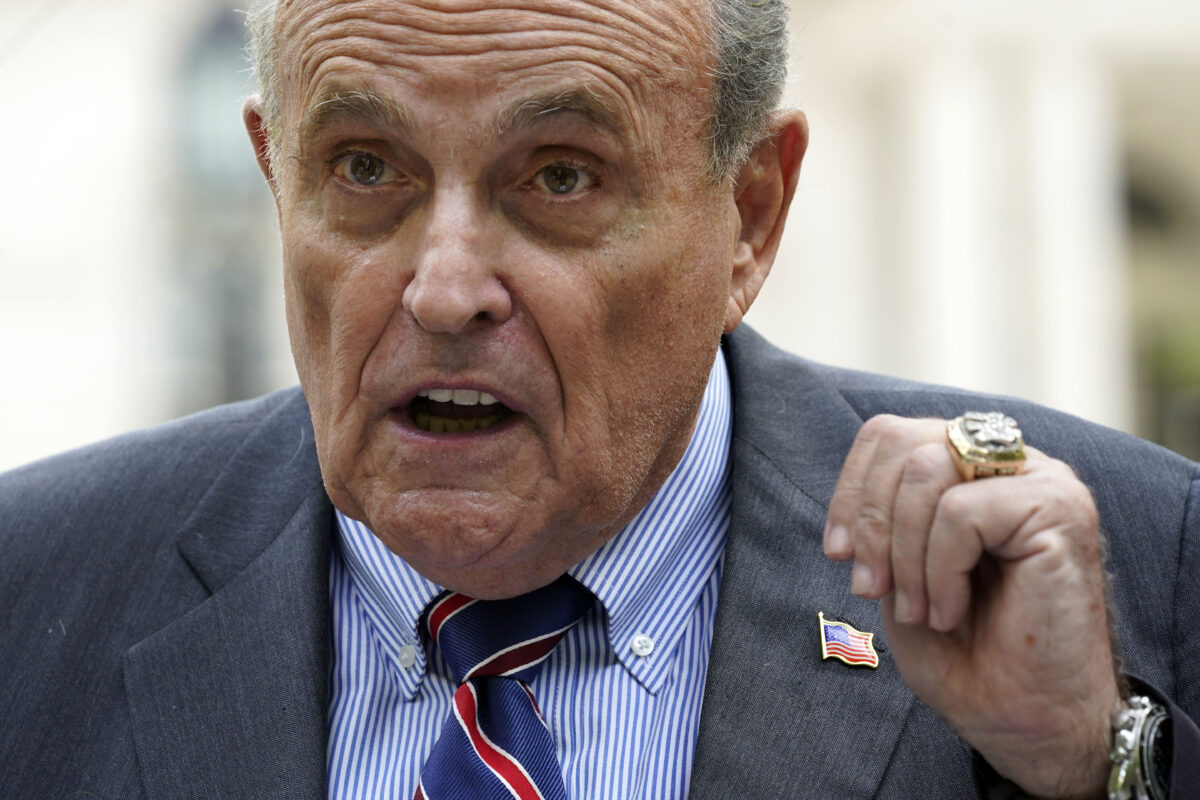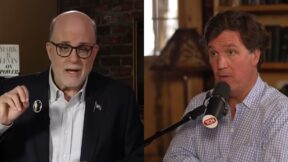Giuliani Liable for Defaming Georgia Election Workers, Slapped With Fine By Judge in Stunning Rebuke

AP Photo/Mary Altaffer, File
The federal judge presiding over the defamation lawsuit filed by two Georgia election workers issued a brutal order against Rudy Giuliani Wednesday, not only declaring a default judgment against the former New York City mayor and a six-figure fine for failure to comply with discovery, but also issuing a warning about further sanctions if he continues to fail to comply with court orders.
The lawsuit is one of many stemming from the false claims and baseless conspiracy theories promoted by former President Donald Trump and his allies that the 2020 election was stolen from him due to widespread fraud, perhaps most notably regarding the defamation case that Dominion Voting Systems settled with Fox News earlier this year for $787.5 million.
Wandrea “Shaye” Moss, who worked as a voter registration officer in Fulton County, and her mother, Ruby Freeman, a temp worker for the 2020 election, were among those targeted by name and falsely accused of committing election fraud, leading to a deluge of harassment and death threats. In December 2021, the mother-daughter pair filed a defamation lawsuit against Giuliani and One America News. A few weeks prior, they had filed a defamation lawsuit against conspiracy theorist blogger Gateway Pundit asserting similar claims.
Giuliani already conceded in court filings in July that the statements he made about Freeman and Moss were statements of fact, were false, and he knew they were false — essentially admitting the key elements needed to prove a defamation claim in court. But that wasn’t enough to end his legal troubles, and his refusal to comply with the court-ordered discovery to disclose his financial assets drew a sharp rebuke from Judge Beryl A. Howell with the U.S. District Court for the District of Columbia.
Howell’s order — accompanied by a 57-page memorandum opinion — granted Freeman and Moss’ motion for sanctions for Giuliani’s discovery violations, smacking him with a $43,684 fine plus ordering him to pay $89,172.50 for the plaintiffs’ attorneys’ fees for enforcing the discovery motion — a total of just under $133,000, a figure which is accruing interest since July for the attorneys’ fees and September for the fine.
The order keeps getting worse for Giuliani, issuing a default judgment “against defendant Rudolph W. Giuliani on his liability for plaintiffs’ defamation, intentional infliction of emotional distress, civil conspiracy, and punitive damage claims,” meaning that legally he is deemed to have lost the lawsuit.
The only remaining issue is how big of a check the man once revered as America’s Mayor will have to write to these two women.
In addition to the six-figure amount of attorneys’ fees and fine already ordered by Judge Howell (plus interest), Freeman and Moss can also collect attorneys’ fees for this most recent motion for sanctions they filed and won.
And then there’s the final item in the order, in which the judge threatens to issue what lawyers call an adverse jury instruction, telling the jury they must interpret the actions by a party to the litigation in a specific negative way because of their improper conduct.
Wrote Howell:
[I]t is further ORDERED that, as a sanction for defendant’s failure timely to reimburse plaintiffs’ $89,172.50 in attorneys’ fees by July 25, 2023, the jury will be instructed that they must, when determining an appropriate sum of punitive damages, infer that he is intentionally trying to hide relevant discovery about his financial assets for the purpose of artificially deflating his net worth, unless he produces fulsome responses to plaintiffs’ RFP Numbers 40 and 41 by September 20, 2023, in which case, the mandatory instruction may be converted to a permissive one.
What this means is that if Giuliani does not comply with the discovery order and turn over documents and information about his financial assets, the jury will be told to they must infer he was intentionally trying to hide this information. Even if he does comply now, the jury will still be instructed they may infer he was trying to hide the information.
All in all, these factors weigh into how a jury considers punitive damage awards. Multiple legal commentators and reporters have noted that Giuliani is potentially facing millions of dollars in damages for this case, including CNN senior reporter Katelyn Polanz.
Ted Goodman, a political adviser to Giuliani, issued a statement to Mediaite complaining about the length of Howell’s opinion:
This 57 page opinion on discovery—which would usually be no more than two or three pages—is a prime example of the weaponization of the justice system, where the process is the punishment. This decision should be reversed, as Mayor Giuliani is wrongly accused of not preserving electronic evidence that was seized and held by the FBI.
Goodman might be well-advised to take some time and read Judge Howell’s opinion before bemoaning its length. A substantial number of those 57 pages are devoted to detailing his client’s repeated and deliberate refusals to comply with standard civil discovery processes, despite Giuliani’s own long legal career. As Howell noted, Giuliani “assured this Court directly that he ‘understand[s] the obligations’ because he has ‘been doing this for 50 years[.]'”
Howell goes on to blast the former Mafia prosecutor for giving “only lip service to compliance with his discovery obligations and this Court’s orders by failing to take reasonable steps to preserve or produce his [electronically stored information],” and for offering “concessions turned slippery on scrutiny and excuses designed to shroud the insufficiency of his discovery compliance” — despite being granted multiple extensions of time to comply.
The judge expressly took Giuliani to task over his public comments about the case (Goodman’s statement above is far from the first time Giuliani or one of his representatives has complained about the “weaponization of the justice system”).
“Donning a cloak of victimization may play well on a public stage to certain audiences,” wrote Howell, “but in a court of law this performance has served only to subvert the normal process of discovery in a straight-forward defamation case, with the concomitant necessity of repeated court intervention.”
The judge threw Giuliani’s own legal career back at him to knock down his attempted defenses. “The fact that Giuliani is a sophisticated litigant with a self-professed 50 years of experience in litigation — including serving as the U.S. Attorney for the Southern District of New York — only underscores his lackluster preservation efforts.”
Howell pointed out Giuliani’s possible motivation in attempting to stonewall the discovery: the multiple other civil and criminal cases swirling around him, but she completely rejected that as a valid justification for his noncompliance, writing that “withholding required discovery in this case has consequences.”
Giuliani’s attempts to avoid discovery by entering two “stipulations” (these are the documents in which he admitted he knowingly made false statements) were further shredded by the judge, who noted that they were “personally executed, but unsworn” and “hold more holes than Swiss cheese” with their language that attempted to weasel out of the very things he was purporting to admit, “expressly reserving” his arguments for appeal.
Giuliani’s antics had turned the discovery process into a “murky mess,” Powell continued, and the Federal Rules of Civil Procedure “provides a remedy: sanctions, including entry of default judgment, against Giuliani.”
“Given the willful shirking of his discovery obligations in anticipation of and during this litigation, Giuliani leaves little other choice,” she wrote.
Much of the following dozens of pages in the opinion is devoted to a blow-by-blow replay of Giuliani’s own court filings, public statements, testimony, and actions during the course of the litigation, illustrating what the judge deemed Giuliani’s deliberate “failure to comply with his basic preservation and production discovery obligations for both himself and his two businesses.” The way he had “exploited these opportunities for delay” dragged out the discovery period by an additional six months, Howell added.
In other words, the opinion that Goodman complains is so long is long precisely because of the magnitude of his client’s own conduct, the vast majority of which Giuliani admitted to doing, was warned repeatedly by the court, but nonetheless continued to refuse to comply.
And for whatever it’s worth, there isn’t anything in the federal rules restricting the length of a judge’s opinion. It is simply not accurate to claim an opinion about months of egregious “generally undisputed, continuing discovery failures” in a potentially multimillion dollar case should only be “two or three pages.”
This article has been updated with additional information.
New: The Mediaite One-Sheet "Newsletter of Newsletters"
Your daily summary and analysis of what the many, many media newsletters are saying and reporting. Subscribe now!






Comments
↓ Scroll down for comments ↓